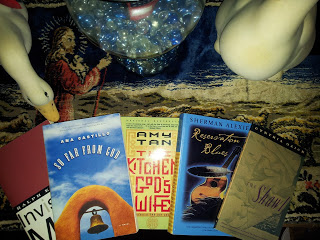 People usually relate what makes American Literature American to authors such as Hemingway, Faulkner, and Fitzgerald (to name a small few). These are the authors persistently taught in American schools, analyzed in American colleges, and referred to as sources of inspiration to up-and-coming American writers. These authors are more than likely viewed as the “essence” of American literature because they contain sharp expressions of what it means to be American (though I believe that's individual-based) and to have the freedom to purse a destiny with pride. Hemingway often wrote of soldiers, faith, and what it means to be honest. Faulkner wrote about America’s south and the importance of individuals maintaining his or her memories during times of change. So one could even state that American classics usually impressed a sense of patriotism, instilled by characters that are normally Caucasian.
People usually relate what makes American Literature American to authors such as Hemingway, Faulkner, and Fitzgerald (to name a small few). These are the authors persistently taught in American schools, analyzed in American colleges, and referred to as sources of inspiration to up-and-coming American writers. These authors are more than likely viewed as the “essence” of American literature because they contain sharp expressions of what it means to be American (though I believe that's individual-based) and to have the freedom to purse a destiny with pride. Hemingway often wrote of soldiers, faith, and what it means to be honest. Faulkner wrote about America’s south and the importance of individuals maintaining his or her memories during times of change. So one could even state that American classics usually impressed a sense of patriotism, instilled by characters that are normally Caucasian. So then is there really a such thing as American Literature canon? I believe literary canon refers to literature that distinctly represents a period of time in American history. Therefore, this literature becomes a critical educational tool, especially when it unveils candid examples of civil discord within certain American ethnic groups. However, whereas American literature undoubtedly consists of diversity, there are many who consider the classics (Faulkner, Hemingway, Fitzgerald) as sole literary canon writers. Because these “canons” are frequently taught in schools and upheld to represent American literature, it can reflect in society in two fashions: bias and suppression of detailed history. Unless taught specifically within a certain curriculum, students are probably less likely to become exposed to examples of Holocaust survivors residing, within their inner struggle, on American soil. Furthermore, African-American literature, featuring the exploitation of slavery leading into the civil right wars, is a teaching tool sometimes glossed upon. You can call it a blank theory of mine, but it wasn't until college that literary diversity was bumped up to the level of necessary and encouraged. Therefore, much of the fore mentioned information is taught in history books, but because of that it lacks the emotion and honest engagement that literature provides. It is seen as facts and not so much needed stories.
 In many respects, ethnic authors have to “beat” Americans’ view of canon literature so that the ethnic perspective within this idea of canon literature can be told clearly. Examples may be disapproval of exposing Latino-American‘s poor treatment in America, or quieting Japanese-Americans from revealing the atrocities of living in an internment camp during World War II while German and Italian-Americans were not. Ethnic writers also have the challenge of not creating misunderstandings between groups and history. Additional challenges are finding only niche readerships, and failing underneath mainstream literature. However, these writers must maintain the honesty of their material, considering the biggest challenge is consciously representing the ethnic groups in which their cultural background resides.
In many respects, ethnic authors have to “beat” Americans’ view of canon literature so that the ethnic perspective within this idea of canon literature can be told clearly. Examples may be disapproval of exposing Latino-American‘s poor treatment in America, or quieting Japanese-Americans from revealing the atrocities of living in an internment camp during World War II while German and Italian-Americans were not. Ethnic writers also have the challenge of not creating misunderstandings between groups and history. Additional challenges are finding only niche readerships, and failing underneath mainstream literature. However, these writers must maintain the honesty of their material, considering the biggest challenge is consciously representing the ethnic groups in which their cultural background resides.
With that said, ethnic writers define literature by remaining honest to their experience. While the canon of traditional American literature defines the representations/reflections of a specific time, ethnic writers must also define him or herself within literature by using the same canon approach from an opposite viewpoint. In turn, this enlightens the scope of past (as well as changing) American events. It's sort of like you can't read about the Civil War from Stephen Crane’s The Red Badge of Courage without following up reading slave narratives, such as Incidents in the Life of a Slave Girl. Each are canon representations of their time periods and American history. Because American is a country that inspires ethnic diversity, it must respect that diversity in its teachings of canon literature. Or what have you.

No comments:
Post a Comment